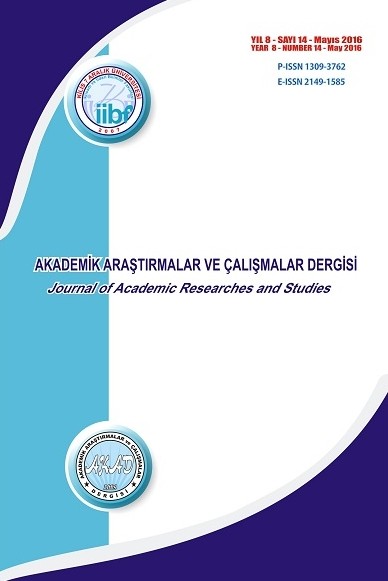TEKNOLOJİ GELİŞTİRME ÇABALARI VE EKONOMİK KALKINMANIN TEORİK ANALİZİ
Kalkınmaya dönük teknolojik çabalar, fiziki üretim süreçlerini iyileştirmeyi, buna eşlik eden toplumsal düzenlemeleri, mevcut teknolojilerin özümsenmesini ve süreç problemlerine uyarlanmasını veya sadece bağımsız bir amaç olarak uyarlama çabasını ifade etmektedir. Yeni teknolojiler ürünlerin ve üretim süreçlerinin bilgi yoğunluğunu artırmışlardır. Eski iktisat yazınında ekonomik ilişkiler sadece fiziksel ürünlerle sınırlı tutulurken artık bilginin firmalar-arası ve firma-içi değişimi, bilginin saklanması, işlenmesi ve kullanılması süreçleri ön plana çıkmıştır. Çalışmamızın ana teması, özellikle küçük ve orta ölçekli firmaların teknoloji edinim çabalarını etkileyen faktörlere ve bu çabaların içeriğine ilişkindir. “Atölye tipi üretim” (batchtype), yaparak öğrenme” (learning by doing) ve “kapasite esnetme” (capacity-sretching) gibi kavramlarla ifade edilen çabalar gelişmekte olan ülkeler için uygun bir teknoloji edinim ve değişim yöntemi olmaktadır.
Anahtar Kelimeler:
Teknoloji, kalkınma, firma çabası
TECHNOLOGY IMPROVING EFFORTS AND THEORETIC ANALYSIS OF ECONOMIC DEVELOPMENT
Technical efforts for economic development refer to improving physical production processes and accompanying social regulations, assimilating new technologies and adaptation of this assimilation into process problems, or adaptation efforts only as independent objectives. New technological improvements increased the products’ and production processes’ information density. While in the past, economic relations were narrowed to physical goods in the literature of economics; information storage, trading information inside the company and among companies, processing and utilization of information processes have gained more importance in the present. The main theme of this study is specifically about the efforts of small and medium scale companies for technology acquisition and the content of these efforts. The efforts expressed with the concepts of “batch production”, “experience based learning” and “capacity stretch” are suitable for the technology acquisition and transition strategies for developing countries.
Keywords:
Technology, development, firm effort,
___
- ARROW, K. “Economic Welfare and the Allocation of Resources for Innovation”, National Bureau of Economic Research, The Rate and Direction of Economic Activity: Economic and Social Factors, (in), Princeton University Press, 1962.
- DAHLMAN, C. J. and FORSECA, F.V. (1978). “From Technological Dependence to Technological Development: The Case of The Usiminas Stell Plant İn Brazil”. Working Paper No. 21 /Ab/Ecla/Ondp Programme, Buenose Airese, October.
- DAHLMAN, C. J. AND SERCOVİCH, F. C. (1984). “Exports Of Technology from Semir Industrial Economies and Local Technological Development”. Journal of Development Economies 16, Pp. 63-99.
- KATZ, J. M. (1987). “Technology Generation in Latin American Manufacturing Industries”, Macmillan, London.
- KATZ, J. M. (1987); “Domestic Technology Generation in LDCs: A Review of Research Findings”, KATZ, J. M. (ed.), (1987a), içinde, London.
- KATZ, J. M., KOSACOFF, B. (1983). “Multinationals from Argentina”. (in), Lall, S. (ed.). “The New Multinationals: The Spread of Third World Enterprises”, pp.137-219. Chichester: John Wiley&Sons.
- KENNEDY, C. (1964). “Induced Bias in Innovation and The Theory of Distribution”. Economic Journal. September.
- KIRIM, A. (1990); “Türkiye İmalat Sanayinde Teknolojik Değişim”, TOBB Yayınları, Ankara.
- KÖKOCAK, A. (2005). “Ekonomik Güç: Bilim ve Teknoloji”. Odak Yayınları, Ankara.
- ROSENBERG, N. (1976). “Perspectives on Technology”. Ch.6, Cambridge University Press, London.
- TEITEL, S. (1993). Industrial and Technological Development”. The Johns Hopkins University Press, Baltimore, USA.
- ISSN: 1309-3762
- Yayın Aralığı: Yılda 2 Sayı
- Başlangıç: 2009
- Yayıncı: Kilis 7 Aralık Üniversitesi
Sayıdaki Diğer Makaleler
DÖVİZ PİYASASI BASKISI MODELLERİNİN YAPAY SİNİR AĞI İLE MUKAYESESİ: TÜRKİYE UYGULAMASI
FİRMALARIN FİNANSMAN KARARLARI: DAVRANIŞSAL PERSPEKTİF
İSTANBUL İLİNDE DERİ ÇANTA SEKTÖRÜNDE TASARIMCI PROFİLİ
Ali KELEŞ, Ceyhun Çağlar KILINÇ, Alper ATEŞ
BİR YEREL E-DEVLET UYGULAMASI: ENGELLİ BİLGİ SİSTEMİ
TEKNOLOJİ GELİŞTİRME ÇABALARI VE EKONOMİK KALKINMANIN TEORİK ANALİZİ
REKLAMLARIN MARKA BİLİNİRLİĞİ AÇISINDAN DEĞERLENDİRİLMESİ: MEYVE SUYU ÜRÜNLERİ ÖRNEĞİ
Ali Şevki AKAY, Mükerrem ATALAY ORAL, Metin Göksel AKPINAR, Mevlüt GÜL
